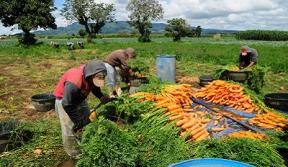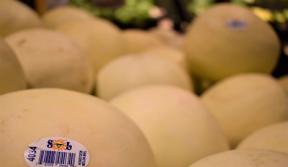The race-to-the-bottom is threatening banana workers.
Over the past 100 years, workers in the Latin American banana industry have fought hard to achieve decent wages, benefits, and working conditions. They have accomplished this in some countries by forming unions. These gains are now being lost as the banana industry is engaged in a "race to the bottom” as companies shift from unionized production to non-union production.
Unionized banana workers can make $10 a day or more, with benefits equivalent to another $10 a day. Most unionized banana workers have access to healthcare, schools for their children, and housing. Most non-union banana workers make $3 a day or less, with no benefits, and no voice at work.
The race to the bottom is led especially by companies operating in Ecuador, the largest banana exporter in the world, and on the Pacific coast of Guatemala. Working conditions, wages, and benefits on banana plantations in Ecuador and the Pacific coast of Guatemala are some of the worst in Latin America. Unlike most of its competitors in the region, Ecuador's banana industry is almost completely non-union, as is the Pacific coast of Guatemala.
Leaders in the Race to the Bottom: Dole and Bonita
The primary leaders of the "race to the bottom" are banana companies that source heavily from low-wage, non-union Ecuador, including Dole and Bonita, and from the Pacific Coast of Guatemala. Ecuador is the world’s largest exporter of bananas. It is a country where banana unions have been successfully resisted by any means necessary, including violence. For example, armed thugs violently attacked Bonita workers on strike at plantations in Ecuador in May 2002, ending the most important organizing effort in decades. It is also nearly impossible for workers to organize unions to improve wages and conditions on the Pacific Coast of Guatemala.
Banana companies have frequently cited the low-wage competition from Ecuador as a reason to cut jobs, wages and benefits, and close plantations in other countries.
Chiquita Tries High Road
In 2001, in a major shift in Chiquita's relations with its unions and its critics, Chiquita signed with its Latin American unions and the International Union of Foodworkers a path-breaking agreement to respect worker rights. Chiquita has sought to differentiate itself from its competitors by taking the "high road" with respect to its relations with banana workers.
USLEAP Response Targets Leaders of the "Race to the Bottom"
USLEAP works with Latin American banana unions, U.S. and international labor groups, and European partners on campaigns and initiatives to stop the "race to the bottom." These include a global campaign against Dole, a boycott of Bonita bananas, support for worker organizing, and engagement on consumer-based initiatives.

